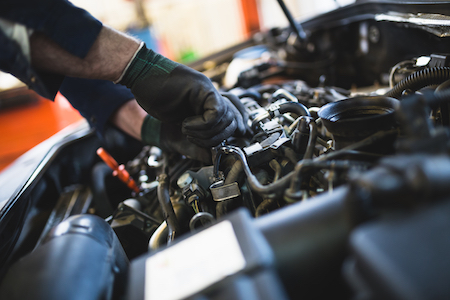You head out into your garage and jump into your car, ready to go to work. You turn the key, and nothing happens.
You’re taking the kids up the mountain for a family getaway. Driving up the hill, you feel it. A jolt. Shuttering. And finally, steam coming up from underneath the hood.
It’s raining out. The car in front of you illuminates the brake lights as it screeches to a stop. You try, but the tires won’t catch. You slide, you turn, you won’t stop …
Ever had any of these things happen to you?
We’re not suggesting that all car problems can be avoided. But in most cases, with a little forethought and regular car maintenance, you’ll have a much better chance of avoiding problems.
Car maintenance is essential.
No matter what is happening in the rest of the world, we as a society cannot survive without access to transportation. Routine car maintenance ensures your vehicle is there, operating well, when you need it. It also is a way to extend the lifespan, and make sure it runs well for the life of your car.
If you avoid small problems, they have the potential to quickly grow into more significant items. And that means more expense for you.
What is car maintenance?
Car owners usually subscribe to one of two approaches for car maintenance.
One decides to wait until their vehicle shows signs of a problem. A dashboard light turns on. They hear a funny noise. Their cars quit working.
The second sets up regular maintenance visits with a service station to ensure their vehicles are operating as they should.
The second catches things before bigger problems occur. They change belts before they break. They add fluid before it becomes a problem. They’re proactive in every action they take. And it shows in their cars. They never leave them stranded. They always work. And if something does happen out of the ordinary, they’re on it before it turns into something more.
The first is always playing catchup. They pay more because everything is an emergency. What would have been a minor problem – changing a belt, for example – moves from an easy task to a complex issue, one that takes a lot of labor and equipment to fix.
When your car was designed back in the factory, the manufacturer knew things would have to be replaced regularly. They wrote the book on it – your owner’s manual is designed to tell you how to watch for things that could go wrong.
Many manufacturers recommend a 30 – 60 – 90 schedule to help car owners think about maintenance. Every 30,000 miles or so, your vehicle will probably require new equipment. At 30,000 miles of driving, your car should be serviced to determine where potential problems lie. Items like rubber hoses, belts, and gaskets only have a specific useful life before they harden, possibly crack. These are consumables – they aren’t designed to last forever.
And while they are inexpensive – a rubber hose doesn’t carry much cost – if it breaks, it can cause significant damage to the systems of your car.
What does regular car maintenance look like?
Let’s start with regular maintenance. If you own a vehicle, you should be servicing your car for an oil change on a regular basis. Check with your owner’s manual to determine the recommended guidelines for replacing your oil and oil filter. With today’s synthetic oils, many cars can safely operate between 5,000 and 10,000 miles before replacement. Of course, driving isn’t the only thing that determines how frequently you should replace your oil. If you only drive a few miles each week and your car sits the majority of time, it should still be replaced in a timely fashion.
Your first 30,000 miles should be reasonably problem-free. If you replace your oil regularly, it should operate well. Around 30,000 miles, it’s time to replace the air and fuel filter.
An air filter helps your engine take in clean air. The dirtier it becomes, the more problems your engine can develop. A fuel filter is designed to give your car a smooth ride. If the right fluids aren’t flowing through the system, you’ll notice it in performance. A mechanic can perform a test to determine if either filter is clogged, and make recommendations accordingly.
If your car has reached the 60,000 point and you haven’t performed a lot of repairs, it’s time to bring it in for a complete car maintenance check. This is the point where minor repair work may begin. This is where easy repairs can be made to extend the life of your car, and to avoid costly emergency work when you least expect it. Things we look at include:
Battery – the average battery is designed to last up to five years, which for the average driver occurs right before the 60,000 mark. Factory grade batteries aren’t designed for a long life. If you still have one in place, replacing it ensures you won’t be stranded.
Brakes – it’s time to check the full functionality of your brake system. The brake system operates by means of a hydraulic system. When you press down on the pedal, it uses brake fluid to control the braking process. It’s not something you replace like motor oil, but it should be checked around the 60,000 mark to ensure it’s performing at its best. Brake pads should also be checked to ensure they are still working correctly. Brake pads squeeze against metal discs called rotors. If the pads are worn or are off balance, it can impact the rotors as well. A mechanic can evaluate the entire brake system and make suggestions to when individual pieces might need repair.
Coolant – your car uses antifreeze to keep the radiator cool. If not enough antifreeze is in the system, the engine will overheat. To prevent damage, it’s important to ensure the proper levels of antifreeze are still in your system. Depending on your vehicle, it might also be wise to flush the cooling system and install new fluids to get rid of any contaminants that may be within the system.
Transmission – if you have low transmission fluid, it can impact the way your car shifts into gear and drives. While your transmission fluid doesn’t have to be replaced as often as motor oil, it’s still a good idea to have a mechanic check it regularly and determine if it needs to be replaced. If your transmission light illuminates on the dashboard, let a mechanic evaluate it to determine your next steps. Transmission fluid is pink and has a sweet smell. If you notice a leak that is darker red, or takes on a burnt smell, it’s a sign your transmission fluid is bad.
https://denverexpresscare.com/is-it-cheaper-to-rebuild-or-replace-a-transmission
The older your car gets, the more stress you put on your vehicle while driving, the more you should check the inner-workings of your car. These are just a few of the milestones we use as guidelines for evaluating a car. City driving is different than highway driving. Your car will have different parts that wear out faster than others. The only way to stay on top of what’s happening is to get to know your car well, and bring it in regularly for a checkup. We’re here for all of your car maintenance needs.
NOTE: Governor Jared Polis has put out executive orders and public health orders to aid in the fight against COVID-19. We are deemed an essential business and will remain open to ensure people throughout the Denver Metro area have the ability to get their vehicles serviced, as needed. If we can answer any questions for you, please contact us at 303.691.2760.
https://covid19.colorado.gov/public-health-executive-orders-explained


 Question: My headlight lenses are all cloudy. I checked with my vehicle dealership about replacing then and it is very expensive. What else can I do?
Question: My headlight lenses are all cloudy. I checked with my vehicle dealership about replacing then and it is very expensive. What else can I do? Air quality affects all drivers no matter where we are. Many decades ago, people began to become more aware of how air pollution negatively affects our health. But have you ever thought about the air quality inside your vehicle?
Air quality affects all drivers no matter where we are. Many decades ago, people began to become more aware of how air pollution negatively affects our health. But have you ever thought about the air quality inside your vehicle? Whenever we are out driving around in our cars, each of us must deal with blind spots. We can greatly minimize blind spots by properly adjusting our vehicle mirrors to give us the widest coverage possible. We should make the adjustments before we pull out of our driveway or parking spot.
Whenever we are out driving around in our cars, each of us must deal with blind spots. We can greatly minimize blind spots by properly adjusting our vehicle mirrors to give us the widest coverage possible. We should make the adjustments before we pull out of our driveway or parking spot.
 Let’s debunk some of the myths about diesel powered vehicles.
Let’s debunk some of the myths about diesel powered vehicles.
 What do you think is the most stolen item from vehicles?
What do you think is the most stolen item from vehicles?